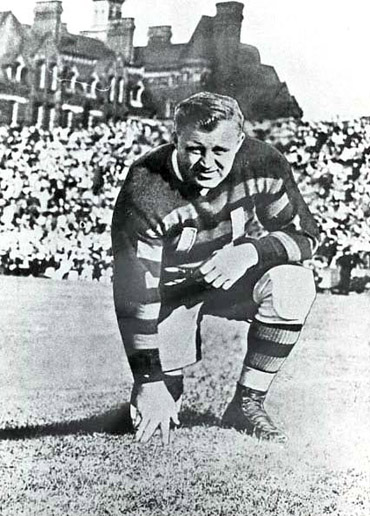Hall of Famer
Brian Timmis
Inducted in 1975
Member Details
Career Highlights
Grey Cup - Hamilton Tigers
Grey Cup - Hamilton Flying Wildcats, coach

Story
In an era when football players played both offense and defense, Brian Timmis was one of Canadian football's most dominant fullbacks and linemen. He was born in Winnipeg, the son of a militia officer. In 1910, his father was reassigned to Ottawa and Timmis and his family moved to the nation's capital. He attended Elgin High School and played local football before enlisting in the signal corps in December 1915, something he accomplished by claiming his birth date was two years earlier than it actually was. Timmis returned from the war and began playing football in 1919 with Ottawa's junior team. Having been released from military service, Timmis joined the Royal Canadian Mounted Police (RCMP). He was assigned to Regina, and when not serving with the Mounties, Timmis played football for the Roughriders. He spent three years playing football in Regina and was a member of the 1923 Roughriders squad that was trounced in the Grey Cup game that year by a Queen's University squad that was the dominant football team in Canada in the early-1920s. It was in Regina, however, that Timmis's reputation as a tough, hard-as-nails fullback willing to plunge into the opposing line was born. It was in a game in 1921, after an opponent nearly strangled him with his own chin strap, that Timmis abandoned his helmet. Incredibly, he played the rest of his career helmetless. Timmis returned to Ottawa and played for the eastern Rough Riders in 1924. In 1925, he moved to Hamilton and one of the dominant football partnerships of the era was born. Timmis played alongside another hall of famer, Dave Sprague, and the two of them as "middle wings" led a devastating Hamilton ground attack that propelled the Tigers to the heights of Canadian football. The Tigers lost the 1927 Grey Cup game to Ted Reeve's Toronto Balmy Beach team but returned the following two seasons to claim the Cup and added a third in 1932, defeating Timmis' former Regina team all three times. During these years, Timmis' punishing running style earned him the label, "the Jack Dempsey of Canadian rugby." Reeve later noted: "It was always a pleasure to play against him, but also a pleasure to get the devil out of [Hamilton] alive." Perhaps his most famous moment on the field came in his final game. Having played for the Tigers for eleven seasons, Timmis retired after the 1935 season. But, in 1938, as they prepared for a playoff game in Ottawa, Tigers management asked three veterans, including Timmis, to come out of retirement. Suffering from infected tonsils and shoulder neuritis, the 38-year-old Timmis played 58 minutes with his left arm hanging uselessly by his side. He left the field to a standing ovation from the Lansdowne Field crowd in Ottawa. Following his playing days, Timmis remained a fixture in the Hamilton sporting community. He coached the Hamilton Flying Wildcats squad to the 1943 Grey Cup and also coached with the Tigers as well as with local high schools. Today, a field adjacent to Hamilton's Ivor Wynne Stadium is named in his honour.






